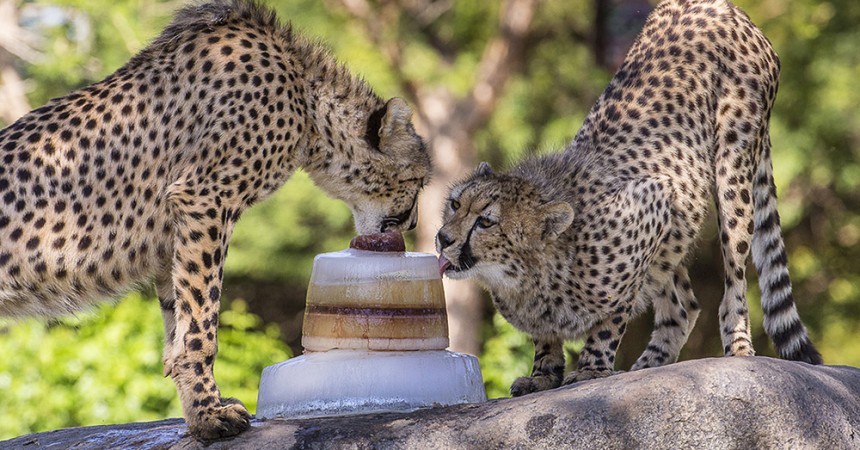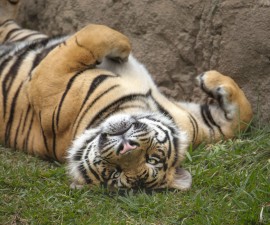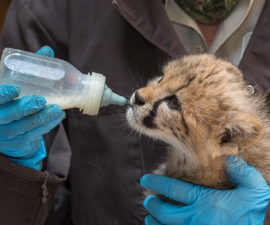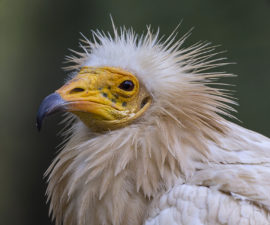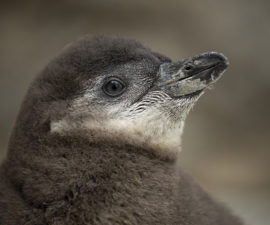Four cheetah cubs at the San Diego Zoo Safari Park turned one year old today and received specially made birthday cakes for breakfast, in celebration. Members of the Safari Park’s nutritional services team made the four individual ice cakes and placed them in the exhibit the cubs share with their mother, Addison. The cakes were made with the cheetahs’ favorite food items: blood, chicken broth, ground meat, and chunked meat, drizzled with more blood for good measure.
The cubs were a little hesitant to try their birthday treats, since this was their first time seeing ice cake. However, following their mother’s lead, they soon gathered around to enjoy the birthday feast—licking the blood- and broth-flavored ice layers and eating every piece of the cake décor. The décor included the word “one” on the front of the cake, written in ground meat, and a cupcake-shaped cake topper complete with a candle, made of ground beef and frozen blood, sprinkled with chunks of meat.
The cakes were given to the cheetahs by their keepers as an enrichment item. Enrichment is important for the cats, as it keeps the animals stimulated and active, allowing them to show their natural behaviors.

The cheetah cubs were born to first-time mother Addison on July 13, 2014 at the Safari Park’s off-site cheetah breeding center. The family moved to the Safari Park’s Okavango Outpost when the cubs were four months old. The two male cubs, named Wgasa and Refu, and the two females, Pumzika and Mahala, were all named after former areas of the Safari Park.
Cheetahs are found in Africa and a small part of Iran. They are classified as vulnerable on the International Union for Conservation of Nature (IUCN) Red List. It is estimated that the worldwide population of cheetahs has dropped from 100,000 in 1900 to just 10,000 today, with about 10 percent living in zoos or wildlife parks.
San Diego Zoo Global has been breeding cheetahs for more than 40 years, yielding more than 150 cubs. It has been instrumental in the formation of a Breeding Center Coalition (BCC) to create a sustainable cheetah population that will prevent extinction of the world’s fastest land animal. Eight other organizations are participating in the breeding program for this endangered species: Fossil Rim Wildlife Center in Glen Rose, Texas; White Oak Conservation Center in Yulee, Fla.; The Wilds and the Cincinnati Zoo in Ohio; the Smithsonian Conservation Biology Institute in Front Royal, Va.; the St. Louis Zoo; the Wildlife Safari in Oregon; and Omaha’s Henry Doorly Zoo.
The cubs and their mother can be seen from the Africa Tram Safari or from the pathway at Okavango Outpost. Through Aug 16, Safari Park guests can enjoy amazing animals like these cheetahs during extended summer hours—from 9 a.m. to 7 p.m. daily—along with special Asian-themed entertainment at the Summer Safari Asian Celebration, included with Safari Park admission and membership.
Bringing species back from the brink of extinction is the goal of San Diego Zoo Global. As a leader in conservation, the work of San Diego Zoo Global includes on-site wildlife conservation efforts (representing both plants and animals) at the San Diego Zoo, San Diego Zoo Safari Park, and San Diego Zoo Institute for Conservation Research, as well as international field programs on six continents. The work of these entities is made accessible to children through the San Diego Zoo Kids network, reaching out through the Internet and in children’s hospitals nationwide. The work of San Diego Zoo Global is made possible by the San Diego Zoo Global Wildlife Conservancy and is supported in part by the Foundation of San Diego Zoo Global.
Photo taken on July 13, 2015 by Ken Bohn, San Diego Zoo Safari Park
CONTACT: SAN DIEGO ZOO GLOBAL PUBLIC RELATIONS, 619-685-3291

